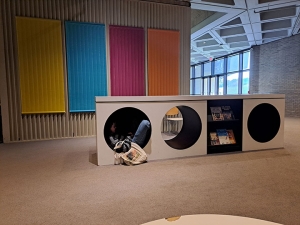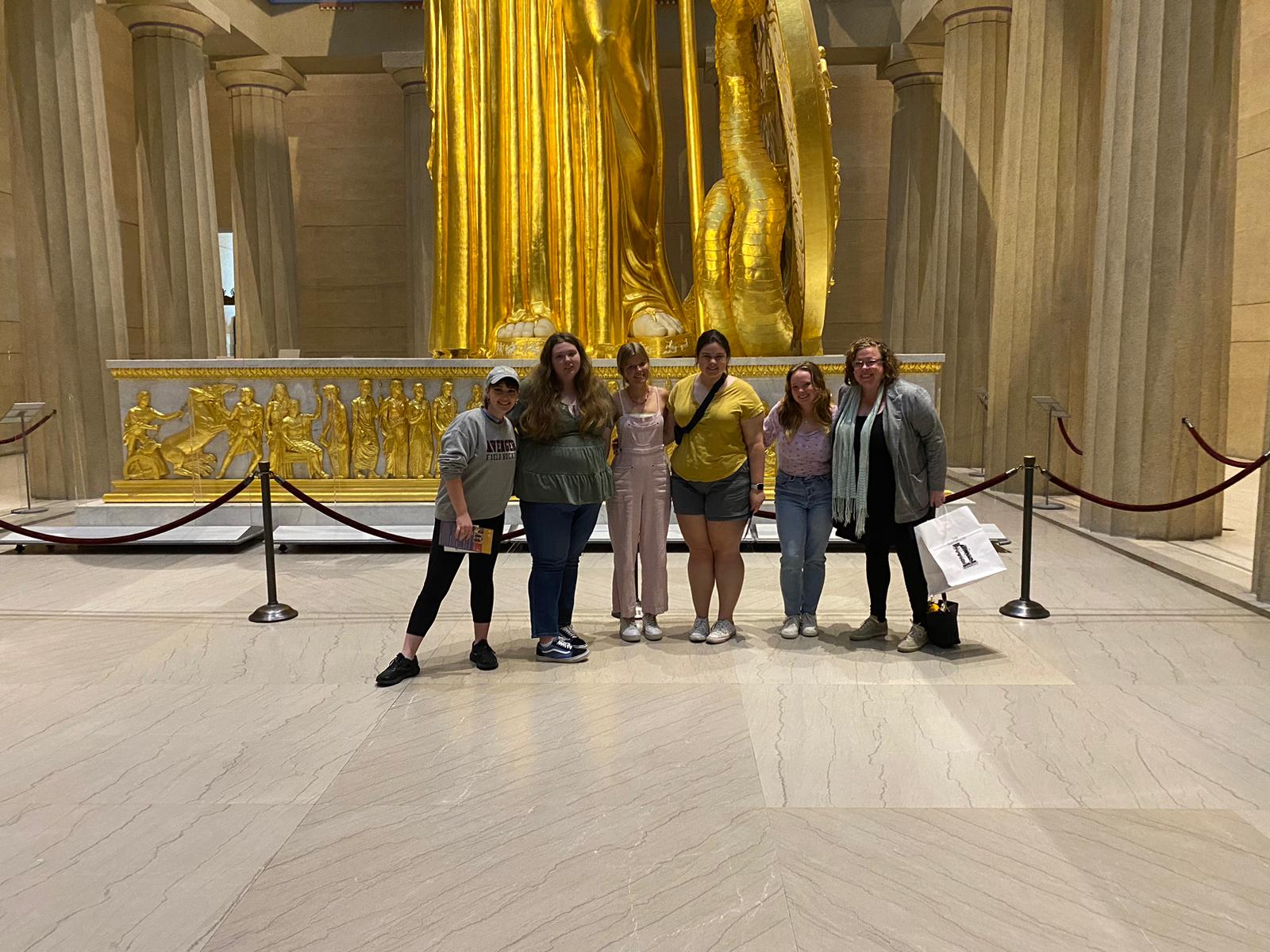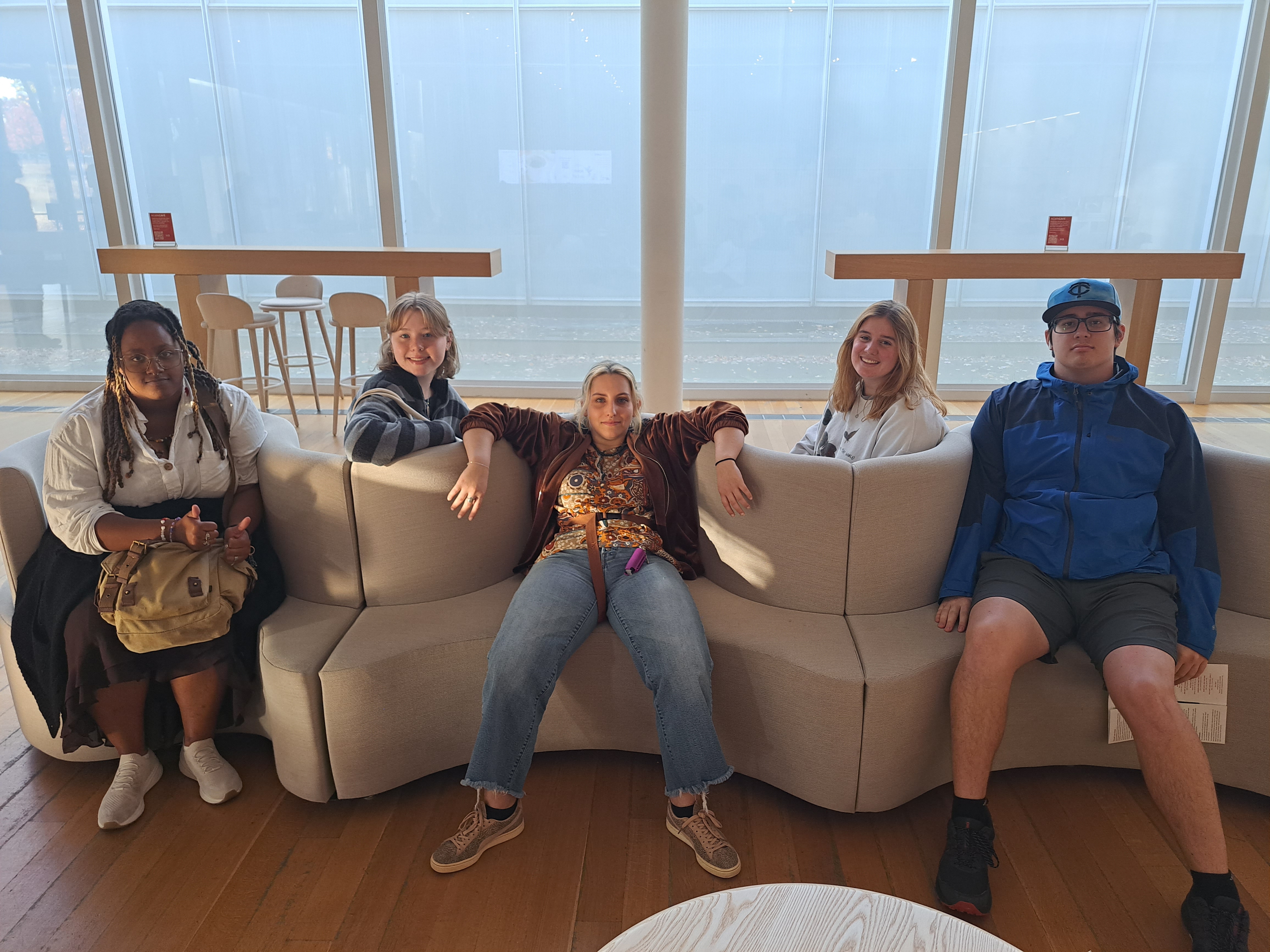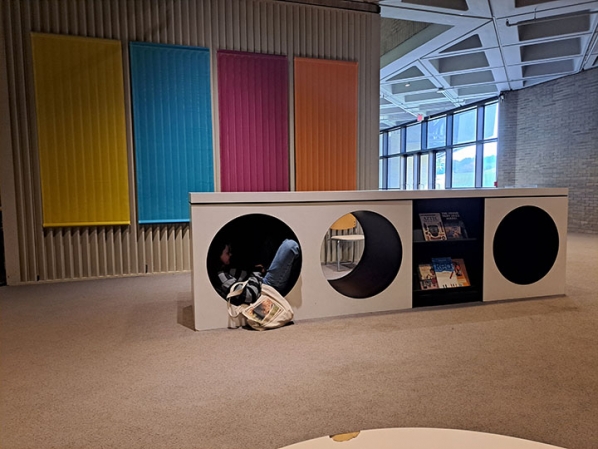Dr. Erin Peters, assistant professor of art history in the Department of Art, led Honors College students enrolled in the honors (410) sections of ARH 2030: Art from Prehistory to 1400 courses on experiential learning travel trips. Dr. Peters took students to Nashville to visit the Nashville Parthenon in the Spring 2023 semester, and to Raleigh to visit the North Carolina Museum of Art (NCMA) in the Fall 2023 semester. Dr. Peters explained the importance of the Honors experiential components in this course:
I find three essential things are hard to bring into the study of art and architecture in a classroom: scale, context, and presence. By working with the goals for an honors section of an art history course - that honors students will gain practical experience, experiential learning, and community through conversation — a field experience like Spring 2023 semester’s visit to the Nashville Parthenon and Fall 2023 semester’s visit to the NCMA boosts the ability for Honors College students in ARH2030 to experience these things, along with the students who are in the non-honors section of the class.
The Spring 2023 group traveled overnight April 15-16 to Nashville to see the Nashville Parthenon, the only exact size and detail replica of the Parthenon in Athens. The Fall 2023 group traveled to Raleigh on Sunday, November 12, 2023. They visited the NCMA ancient collections with the advice of Dr. Caroline Rocheleau, curator of ancient art and director of research at NCMA. They saw the following collections: African including Egyptian; Greek, Italian, and Roman; ancient American; and the traveling exhibition: Dutch Art in a Global Age – Masterpieces from the Museum of Fine Arts, Boston. The students selected Midtown Phofor a meal and conservation afterwards.
Photos above show Honors College students (left) at the Nashville Parthenon during the Spring 2023 semester, and (right) at the NCMA in Raleigh during the Fall 2023 semester. Photos by Dr. Erin Peters.
ARH 2030 is an App State general education course with the following description: “This course offers students a basic foundation in the discipline of art history and brief introduction to art before the year 1400 from around the world. This survey will be in no way exhaustive. Rather, we will consider the broad scope of over 60,000 years of human creativity and making as an opportunity to travel in time and around the globe studying art through the unique lens of art historical inquiry. The course is meant to be explorative and enjoyable. We will examine how artists, from the earliest makers during the Paleolithic age through the early Gothic period in Europe (roughly 65,000 BCE to 1400 CE), created meaning by manipulating natural materials and turning them into lasting statements. The course covers the breadth of artistic production, surveying the art of Europe, Asia, Africa, the Americas, and Oceania. Across this broad temporal and geographical spanse, we will delve into how art objects are primary evidence that allow us to reconstruct the past and help us navigate our present. The two most important skills that you will be expected to develop and practice in this course are visual analysis of form and critical thinking of context in your engagement with the class material and in discussions within our class.” The course also fulfills a requirement in the Classical and Mediterranean Civilizations minor.
Dr. Peters requires experiential learning for the 410 honors section of ARH 2030. These trips serve as the primary part of the Honors Colleges students’ broader, deeper, required assessment for the honors sections. After travel, students return to the classroom to share their experiences via presentations. An alternative assignment for students who could not join the trip included researching objects on the NCMA’s website and comparing them online with objects on display at App State’s Turchin Center for Visual Arts on their own time. The Turchin is free for students.
Dr. Peters shared more about the learning objectives for the course explaining the importance of the Honors experiential learning components: “The class purposefully traverses the widest span of time and diversity of places so students build knowledge of the vast scope of human productivity. To approach this material, students learn basic skills of art history - visual analysis and critical thinking. Through visual analysis, students gain visual acuity, which builds perceptive abilities in close looking. In slowing down and investigating a fuller picture, students learn how meaning is made, and can make new meaning through critical thinking. All of this is part of building essential perceptual skills, which are fleeting given our rapid entrenchment into digital existence and away from physical contact and communication.”
The following five Honors Colleges students traveled with Dr. Peters to Nashville for the Spring 2023 ARH 2030.410 of the course. Each student made an individual digital story and together they made a group video to present to the class. Those are linked with each student’s name below. These students remarked on the ways seeing the replica of the Athenian Parthenon in-person expanded their connections to the class material and helped them build community. As Alice Paschall stated,
“The trip we took to Nashville to see the Parthenon replica gave us a way to see what we were learning about in class in 3D- it was also so fun to get to bond with some of the other honors college students!!”
- Alice Paschall: an art education (K-12) major who entered the Honors College at App State in Fall 2022 semester and intends to graduate May 2026.
- Katherine Buchanan: a history major with a human resource management minor who entered the Honors College at App State in Fall 2021 semester and intends to graduate December 2024.
- Emily Grant: English major with a professional writing concentration and business minor who entered the Honors College at App State in Fall 2022 semester and intends to graduate May 2026.
- Katie Weekers: a graphic design major who entered the Honors College at App State in Fall 2022 semester and intends to graduate May 2025.
- Alissa Goble: a studio art major who entered the Honors College at App State in Fall 2022 semester and intends to graduate May 2026.
Photo above features Honors Colleges students in the Fall 2023 honors (.410) section of Dr. Erin Peters ARH 2030: Art from Prehistory to 1400 at the North Carolina Museum of Art (NCMA) in Raleigh (left to right): Katie Weekers, Emily Grant, Alice Paschall, Katherine Buchanan, Alissa Gobels, and Dr. Erin Peters.
In the Fall 2023 honors section of the course, Dr. Peters traveled with the following Honors College students to the NCMA in Raleigh.
- Hannah Cummings: an English major with a creative writing concentration who entered the Honors College at App State in Fall 2022 semester and intends to graduate December 2025.
- Paige Devlin: an art education (K-12) major who entered the Honors College at App State in Fall 2022 semester and intends to graduate May 2026.
- Savannah Faunce: a photography major with a commercial photography concentration who entered the Honors College at App State in Fall 2022 semester and intends to graduate May 2026.
- Ethan Olsen: an art and visual culture, art history major who entered the Honors College at App State in the Fall 2022 semester and intends to graduate May 2026.
- Savanah Rowland: an interior design major who entered the Honors College in the Fall of 2023 and intends to graduate May 2027.
Photo above features Honors Colleges students in the Fall 2023 honors (.410) section of Dr. Erin Peters ARH 2030: Art from Prehistory to 1400 at the North Carolina Museum of Art (NCMA) in Raleigh (left to right): Damien Cummings, Savannah Faunce, Paige Devlin, Savanah Rowland, and Ethan Olsen.
Dr. Peters uses professional connections and connects with curators like Dr. Caroline Rocheleau, a colleague Dr. Peters worked with in the past, to develop the day’s activities. Dr. Rocheleau was not able to meet the group in person during their visit as they were flying internationally, and instead left catalogs, public programming information, and products related to the Bacchus Conservation Project for the group to review. Dr. Rocheleau also shared the following advice with the group:
“The whole museum (both buildings) was completely reinstalled last year and that’s exciting on so many levels. The aGIR (ancient Greece, Italy, and Rome) galleries are fully thematic now and far more interesting than they used to be. The catalog of that collection should be coming out next year. [The] Egypt [exhibition] didn’t change much—it’s such a small collection—but the revised grouping of objects is more eloquent than before. The Ancient American collections finally have the same floor space as the other antiquities and those galleries are lovely. That in and of itself is a must-see. As for must-sees, in the aGIR, I think the Statue of Bacchus and the interactive associated with the Bacchus Conservation Project are interesting. The Egyptian galleries, the False Door and the coffins are usually the main attractions. But the Figure of a Man is impressive and take a look at the Roman shroud if it’s still on view. This artifact rotates so one can only see it once in a while!”
Dr. Peters is excited to add opportunities for experiential learning to additional places and times in future honors sections of this class and others offered as part of the ancient art history curriculum. An honors section of ARH 2030 will be offered in the upcoming spring 2025 semester. Dr. Peters is thrilled that students study several places for which the NCMA has impressive collections, such as ancient Africa including Egypt, ancient South America, and ancient Greece, Italy, and Rome. Honors students, stay tuned for future trips with Dr. Peters!
Top photo features a student from Dr. Peters’ ARH 2030.410 Honors College experiential learning trip to the NCMA in Raleigh.




